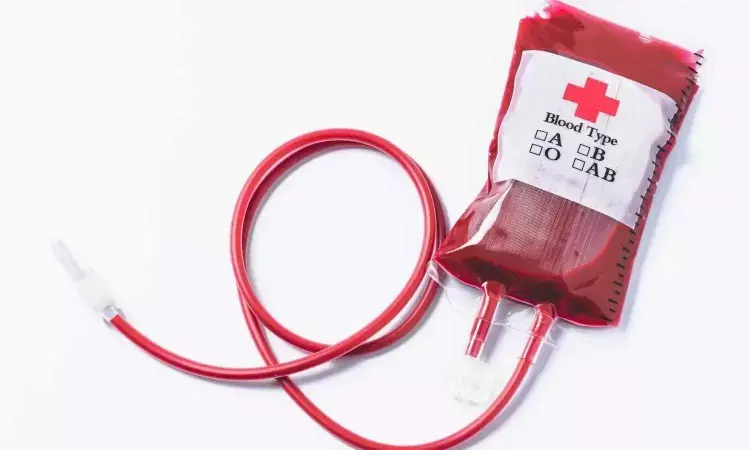- Home
- Medical news & Guidelines
- Anesthesiology
- Cardiology and CTVS
- Critical Care
- Dentistry
- Dermatology
- Diabetes and Endocrinology
- ENT
- Gastroenterology
- Medicine
- Nephrology
- Neurology
- Obstretics-Gynaecology
- Oncology
- Ophthalmology
- Orthopaedics
- Pediatrics-Neonatology
- Psychiatry
- Pulmonology
- Radiology
- Surgery
- Urology
- Laboratory Medicine
- Diet
- Nursing
- Paramedical
- Physiotherapy
- Health news
- Fact Check
- Bone Health Fact Check
- Brain Health Fact Check
- Cancer Related Fact Check
- Child Care Fact Check
- Dental and oral health fact check
- Diabetes and metabolic health fact check
- Diet and Nutrition Fact Check
- Eye and ENT Care Fact Check
- Fitness fact check
- Gut health fact check
- Heart health fact check
- Kidney health fact check
- Medical education fact check
- Men's health fact check
- Respiratory fact check
- Skin and hair care fact check
- Vaccine and Immunization fact check
- Women's health fact check
- AYUSH
- State News
- Andaman and Nicobar Islands
- Andhra Pradesh
- Arunachal Pradesh
- Assam
- Bihar
- Chandigarh
- Chattisgarh
- Dadra and Nagar Haveli
- Daman and Diu
- Delhi
- Goa
- Gujarat
- Haryana
- Himachal Pradesh
- Jammu & Kashmir
- Jharkhand
- Karnataka
- Kerala
- Ladakh
- Lakshadweep
- Madhya Pradesh
- Maharashtra
- Manipur
- Meghalaya
- Mizoram
- Nagaland
- Odisha
- Puducherry
- Punjab
- Rajasthan
- Sikkim
- Tamil Nadu
- Telangana
- Tripura
- Uttar Pradesh
- Uttrakhand
- West Bengal
- Medical Education
- Industry
First-ever clinical trial of lab-grown blood cell transfusion aimed at combating rare disorders in UK

The team, including researchers from the University of Cambridge in the UK, said the blood cells were grown from stem cells from donors. The red cells were then transfused into healthy volunteers. This is the first time in the world that red blood cells that have been grown in a laboratory have been given to another person as part of a trial into blood transfusion, they said.
London: For the first time in a landmark clinical trial, red blood grown in a laboratory has been given to humans by scientists in the UK. The researchers said that if proven safe and effective, manufactured blood cells could significantly improve treatments for people with blood disorders such as sickle cell and rare blood types.
It can be difficult to find enough well-matched donated blood for some people with these disorders, they said.
Also Read:Therapies identified for patients whose blood cancer relapses after CAR-T
The team, including researchers from the University of Cambridge in the UK, said the blood cells were grown from stem cells from donors. The red cells were then transfused into healthy volunteers. This is the first time in the world that red blood cells that have been grown in a laboratory have been given to another person as part of a trial into blood transfusion, they said.
"We hope our lab-grown red blood cells will last longer than those that come from blood donors," said chief investigator Cedric Ghevaert, a professor at the University of Cambridge and NHS Blood Transplant.
"If our trial, the first such in the world, is successful, it will mean that patients who currently require regular long-term blood transfusions will need fewer transfusions in the future, helping transform their care," Ghevaert said in a statement.
The trial is studying the lifespan of the lab-grown cells compared with infusions of standard red blood cells from the same donor.
The lab-grown blood cells are all fresh, so the trial team expects them to perform better than a similar transfusion of standard donated red cells, which contains cells of varying ages, the researchers said.
If manufactured cells last longer in the body, patients who regularly need blood may not need transfusions as often, reducing iron overload from frequent blood transfusions, which can lead to serious complications, they said.
"This challenging and exciting trial is a huge stepping stone for manufacturing blood from stem cells," said Ashley Toye, a professor at the University of Bristol.
"This is the first-time lab-grown blood from an allogeneic donor has been transfused and we are excited to see how well the cells perform at the end of the clinical trial," Toye said.
For the foreseeable future, manufactured cells could only be used for a very small number of patients with very complex transfusion needs, the researchers said.
Two people have so far been transfused with the lab-grown red cells. They were closely monitored and no untoward side effects were reported, they said. The participants are well and healthy. The identities of infused volunteers so far are not currently being unveiled, to help keep the trial 'blinded'.
The amount of lab-grown cells being infused varies but is around 5-10 ml - about one to two teaspoons. Donors were recruited from a blood donor base. They donated blood to the trial and stem cells were separated out from their blood. These stem cells were then grown to produce red blood cells in a laboratory. The recipients of the blood were recruited from healthy people.
A minimum of 10 participants will receive two mini transfusions at least four months apart, one of the standard donated red cells and one of lab-grown red cells, to find out if the young red blood cells made in the laboratory last longer than cells made in the body.
Also Read:DCGI asks all Blood banks to register on e-RaktKosh
Kajal Rajput joined Medical Dialogues as an Correspondent for the Latest Health News Section in 2019. She holds a Bachelor's degree in Arts from University of Delhi. She manly covers all the updates in health news, hospitals, doctors news, government policies and Health Ministry. She can be contacted at editorial@medicaldialogues.in Contact no. 011-43720751


